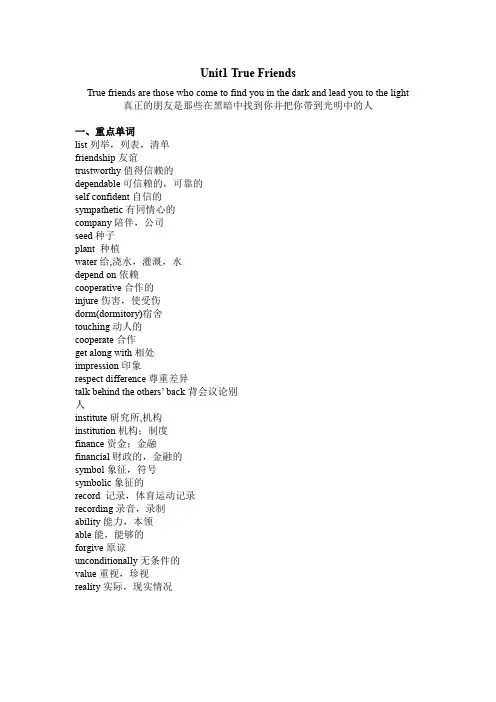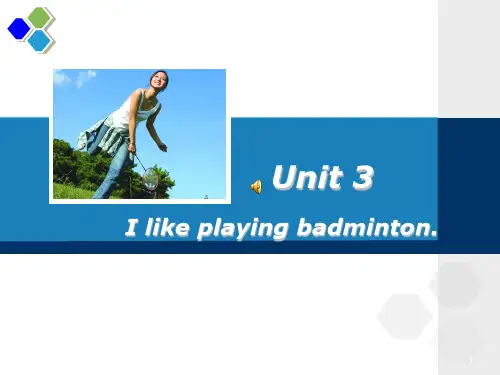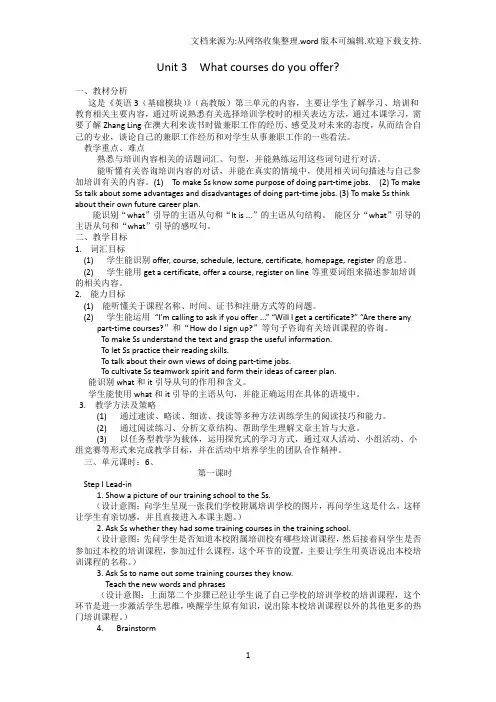中职英语基础模块上册第三单元课文知识讲解
语文版中职英语基础模块3 Unit1重点语言知识归纳

Unit1 True FriendsTrue friends are those who come to find you in the dark and lead you to the light 真正的朋友是那些在黑暗中找到你并把你带到光明中的人一、重点单词list列举,列表,清单friendship友谊trustworthy值得信赖的dependable可信赖的,可靠的self confident自信的sympathetic有同情心的company陪伴,公司seed种子plant 种植water给,浇水,灌溉,水depend on依赖cooperative合作的injure伤害,使受伤dorm(dormitory)宿舍touching动人的cooperate合作get along with相处impression印象respect difference尊重差异talk behind the others’ back背会议论别人institute研究所,机构institution机构;制度finance资金;金融financial财政的,金融的symbol象征,符号symbolic象征的record 记录,体育运动记录recording录音,录制ability能力,本领able能,能够的forgive原谅unconditionally无条件的value重视,珍视reality实际,现实情况二、重点短语Warm-upmake friends with sb. 跟某人交朋友in one’s good/bad times 在某人好/坏的时段be honest with 对……诚实in one’s opinion 在某人看来be able to 能够be loyal to 对某人忠诚be kind to 对某人和蔼Listeningsit down 坐下know about 了解get away 离开see sb. cry 看到某人哭take a seat 就座lose touch 失去联系Readingin the way of 以……方式mutual understanding 互相理解stand by sb. 支持某人in difficult times 在困难时期enjoy each other’s company 享受互相陪伴share the same interests 分享共同兴趣just as 正如develop friendship 发展友谊take care of 照顾tend to 照料,呵护depend upon 依靠share... with... 跟……分享Speakinglook for 寻找for example 比如in the training room 在实习室in a short time 在短时间give sb. an A 给某人一个Ahelp sb. with 帮某人学习Culture Cornerbelieve in 信任give up 放弃invite sb. over 邀请某人过来offer support 提供支持pick sb. up 支持某人raise one’s spirits 鼓舞士气tell you the truth 告诉你真相in danger 处于危险中zap sb. back to 把某人拉回到三、重点句子Listening1.If you can’t remember my name,please sit down.2. Sit down if you don't know about the woman who got away.3.If you’ve never seen me cry,please sit down.4. Take a seat,if somehow we’ve lost touch.5.A friend is someone who believes in you.1.如果你记记得我的名字,请坐下。
中职英语基础模块修订版(上)unit3教材课件.共57页文档

12、法律是无私的,对谁都一视同仁。在每件事上,她都不徇私情。—— 托马斯
13、公正的法律限制不了好的自由,因为好人不会去做法律不允许的事 情。——弗劳德
14、法律是为了保护无辜而制定的。——爱略特 15、像房子一样,法律和法律都是相互依存的。——伯克
25、学习是劳动,是充满思想的劳动。——乌申斯基
谢谢!
21、要知道对好事的称颂过于夸大,也会招来人们的反感轻蔑和嫉妒。——培根 22、业精于勤,荒于嬉;行成于思,毁于随。——韩愈
23、一切节省,归根到底都归结为时间的节省。——马克思 24、意志命运往往背道而驰,决心到最后会全部推倒。——莎士比亚
语文版中职英语(基础模块 上册)Unit 3《Campus Life》ppt课件1

编后语
• 同学们在听课的过程中,还要善于抓住各种课程的特点,运用相应的方法去听,这样才能达到最佳的学习效果。 • 一、听理科课重在理解基本概念和规律 • 数、理、化是逻辑性很强的学科,前面的知识没学懂,后面的学习就很难继续进行。因此,掌握基本概念是学习的关键。上课时要抓好概念的理解,
同时,大家要开动脑筋,思考老师是怎样提出问题、分析问题、解决问题的,要边听边想。为讲明一个定理,推出一个公式,老师讲解顺序是怎样的, 为什么这么安排?两个例题之间又有什么相同点和不同之处?特别要从中学习理科思维的方法,如观察、比较、分析、综合、归纳、演绎等。 • 作为实验科学的物理、化学和生物,就要特别重视实验和观察,并在获得感性知识的基础上,进一步通过思考来掌握科学的概念和规律,等等。 • 二、听文科课要注重在理解中记忆 • 文科多以记忆为主,比如政治,要注意哪些是观点,哪些是事例,哪些是用观点解释社会现象。听历史课时,首先要弄清楚本节教材的主要观点,然 后,弄清教材为了说明这一观点引用了哪些史实,这些史料涉及的时间、地点、人物、事件。最后,也是关键的一环,看你是否真正弄懂观点与史料间 的关系。最好还能进一步思索:这些史料能不能充分说明观点?是否还可以补充新的史料?有无相反的史料证明原观点不正确。 • 三、听英语课要注重实践 • 英语课老师往往讲得不太多,在大部分的时间里,进行的师生之间、学生之间的大量语言实践练习。因此,要上好英语课,就应积极参加语言实践活 动,珍惜课堂上的每一个练习机会。
Wish best regards. 祝好。 Thank you for your help 感谢你的帮助! Please remember me to your parents.
Please say hello to your parents. 请代我向你父母问好 Wishing you a happy holiday. 祝假日愉快! Hoping to hear from you soon. 希望能尽快收到你的回信。
中职英语基础模块修订版(上)unit3ppt课件

S2: Who do you often read with? S1: Mary, my cousin.
Listening and Speaking
3 Listen again and act. 再听录音,根据提示表演对话。
play basketball play football
3 Listen again and act. 再听录音,根据提示表演对话。
do shopping do reading
S1: What do you usually do after school, Amy?
S2: I usually do shopping with my sister. It’s a lot of fun.
Listening and Speaking
5 Read and discuss. 根据示例谈论萨姆的活动。
What is Sam doing at 12:00 at noon? He is having lunch.
Listening and Speaking
5 Read and discuss. 根据示例谈论萨姆的活动。
take a walk
play ping-pong watch TV
take a nap
Listening and Speaking
5 Read and discuss. 根据示例谈论萨姆的活动。
What is Sam doing at 8:00 in the morning? He is having breakfast.
参考译文
midnight:午夜,半夜12点; until midnight:直到午夜。
高教版中职英语基础模块第3册Unit3Whatcoursesdoyouoffer

Unit 3 What courses do you offer?一、教材分析这是《英语3(基础模块)》(高教版)第三单元的内容,主要让学生了解学习、培训和教育相关主要内容,通过听说熟悉有关选择培训学校时的相关表达方法,通过本课学习,需要了解Zhang Ling在澳大利来读书时做兼职工作的经历、感受及对未来的态度,从而结合自己的专业,谈论自己的兼职工作经历和对学生从事兼职工作的一些看法。
教学重点、难点熟悉与培训内容相关的话题词汇、句型,并能熟练运用这些词句进行对话。
能听懂有关咨询培训内容的对话,并能在真实的情境中,使用相关词句描述与自己参加培训有关的内容。
(1) To make Ss know some purpose of doing part-time jobs. (2) To make Ss talk about some advantages and disadvantages of doing part-time jobs. (3) To make Ss think about their own future career plan.能识别“what”引导的主语从句和“It is ...”的主语从句结构。
能区分“what”引导的主语从句和“what”引导的感叹句。
二、教学目标1. 词汇目标(1) 学生能识别offer, course, schedule, lecture, certificate, homepage, register的意思。
(2) 学生能用get a certificate, offer a course, register on line等重要词组来描述参加培训的相关内容。
2. 能力目标(1) 能听懂关于课程名称、时间、证书和注册方式等的问题。
(2) 学生能运用“I’m calling to ask if you offer ...” “Will I get a certificate?” “Are there anypart-time courses?”和“How do I sign up?”等句子咨询有关培训课程的咨询。
中职英语3(基础模块)Unit3课件

Are teachers there qualified?
Is the tuition fee expensive?
How to register?
Listen and decide.
Do they offer the course I want to learn?
Can I get a certificate?
□ Language □ Computer
□ Full-time □ Part-time
□ Fax
□ Online
Listen and underline.
Sally: Good morning. This is Jinghai Training School. What Can I do for you?
development in this field. Sally: Good! Will I get a certificate after the program? David: Sure. Sally: Are there any part-time courses?
Yes. We have both night and weekend courses for those who have to work at daytime. David: How do I sign up? Sally: You can find our homepage on the Internet and fill in the application form online. David: Great! It is good news to me that I can register online. Thank you very much. Sally: You are welcome!
中职英语基础模块三Unit ppt课件
ppt课件
21
Read and match.
1) You move into a new apartment.
2) You enter your apartment at night.
3) You are away but will be home soon.
Linda: You should pay attention to the traffic lights and the traffic signs on
the road.
Ben: Yeah, I think that’s very important.
Linda: Never drive when you are sleepy and remember not to use your
ppt课件
4
Listen and answer.
They are talking about a traffic accident.
Wh
at
are
the
spe
ake
practice.
A: What are the causes of most car accidents? B: In my opinion, speeding is perhaps the main cause of car accidents.
mobile phone while driving.
Ben: Thank you for giving so much advice.
Linda: Be safe!
ppt课件
11
Listen and complete.
1. Never drive _a_f_te_r__d_ri_n_k_i_n_g___. 2. Know _s_p__e_e_d_l_im__it_____. 3. Don’t drive __to_o__fa__st________. 4. Pay attention to _th_e__tr_a_f_fi_c_l_ig_h_t_s__ and _t_h_e__tr_a_ff_i_c_s_i_g_n_s_. 5. Never drive __w_h_e_n__y_o_u__a_re__s_le_e_p_y___. 6. Do not use __y_o_u_r_m__o_b_il_e_p__h_o_n_e_w__h_il_e_d_r_i_v_in_g____.
中职英语基础模块修订版上unit3教材课件
去游泳
Warming up
play badminton
打羽毛球
Warming up
play basketball
打篮球
Warming up
play ping-pong
打乒乓球
Warming up
go jogging
慢跑
1. Mike plans to go hiking this weekend.
3 Listen again and act. 再听录音,根据提示表演对话。
do shopping do reading
S1: What do you usually do after school, Amy?
S2: I usually do shopping with my sister. It's a lot of fun.
参考译文
莉萨:我喜欢待在家里,看书、看电视、听 音乐。我不喜欢运动和户外活动。
Reading and Writing
3 Read and find. 读下文,了解下列三人各自的问题。
Paula
I often eat hamburgers and drink a lot of coke. I don't like fruits and vegetables.
S2: Who do you often play with? S1: My classmates.
Listening and Speaking
4 Listen and fill. 听录音,补充萨姆周末一天活动的信息。
have breakfast
have dancing classes
have lunch
中职英语基础模块第一册第三单元
Speaking Practical grammars Reading
Writing
Unit Three Internet
Warming up
Speaking Practical grammars Reading
Writing
Warming up
Activity 1
• Look at the picture and talk about it. 看图说话,简单谈谈你对互联网的 认识。下面是供参考的句子。
Activity 2
Think for a while 想一想!
Does the internet all do the good things? What’s the disadvantages of it? Give us some examples.
Activity 3
Internet Addiction Test please answer the following questions using this scale: 1 = Rarely.
2 = Occasionally. 3 = Frequently. 4 = Often. 5 = Always. 0 = Does not applied.
1. How often do you find that you stay on-line longer than you intended?
4.以辅音字母+y结尾的名词,把y改为i再加es: 例:city---cities, family---families
5.以f或fe结尾的名词,变f或fe为v再加es
例:leaf-leaves, knife-knives, wife-wives
中职英语基础模块上册 Unit3 Campus Life
虚词 (意义不完整,不能独立 作句子成分的词)
“名代动→数形副→介冠连感”
friend with
kind adj.和蔼的,亲切的
kindness n.和蔼,友善
be kind to 对……和蔼可亲的
It’s kind of sb. to do sth. ……对某人来说太仁慈了
Eg. (1) The teacher is kind to all of us.
(2) It’s kind ___ me.
The young man always shows off his brand coats.
那个年轻人总是炫耀他的名牌外套
(1) with the help of 在……的帮助下
Eg: With the help of my sister, I finished
my novel.
在我姐姐的帮助下我完成了我的小说
bus
buses
map maps
class classes
potato potatoes
student students
desk desks
woman women
family families
teacher teachers
orange oranges
leaf
leaves
watch watche . city scities . day days . knife knives .
- 1、下载文档前请自行甄别文档内容的完整性,平台不提供额外的编辑、内容补充、找答案等附加服务。
- 2、"仅部分预览"的文档,不可在线预览部分如存在完整性等问题,可反馈申请退款(可完整预览的文档不适用该条件!)。
- 3、如文档侵犯您的权益,请联系客服反馈,我们会尽快为您处理(人工客服工作时间:9:00-18:30)。
glass(玻璃) a glass(一个玻璃杯),tea(茶) two teas(两
•
一般可数,有单复数形式。
•
(3)物质名词。如:rice,water,cotton等。
•
一般不可数,没有单复数之分。
•
(4)抽象名词。如:love,work,life等。
•
一般不可数,没有单复数之分。
•
2. 专有名词:如:China,Newton,London等。
• 名词可数名词和不可数名词 • 不可数名词一般没有复数形式, • 如:water---some water , milk---a glass of milk • 可数名词有单数和复数两种形式。
•
• (一)可数名词的复数形式的构成规则
• 在英语中,可数名词如果表示的数量为“一 个”,则用其单数形式,若表示的数量为 “一个以上”,则
• 1. 一般情况下在名词的词尾加s,如:
• book--- books,pencil ---pencils.
• 2. 以-s,-x,-ch,-sh结尾的名词加-es,
当数词大于1时,量词须变为复数。如:a piece of advice(一条
建议) five pieces of advice(五条建议),a bag of rice(一袋大
米) three bags of rice(三袋大米)。
•
可数名词的量也可以用适当的量词来表达。
•
2. 不可数名词的转化
•
(1)物质名词表示种类或具体事物时则成为可数名词。如:
•
(二)不规则名词的复数形式
•
1. 改变单数名词中的元音字母或其他形式。如:
man men,woman women,tooth teeth,foot feet,
mouse mice,child children等。
•
2. 单复数形式相同。如:sheep,deer,fish等,以
及由汉语音译表示度量、币制等单位的名词。如:yuan.
•
(3)由man或woman作为第一部分的复
数名词,两个组成部分皆变为复数形式。如:
man driver men drivers,woman doctor women
doctors等。
• (三)几种特殊的复数形式的名词
•
1. 有些表示由两部分构成的东西和部分学科的
名词总以复数的形式出现。如:glasses(眼镜),
注意:Englishman Englishmen,Frenchman
Frenchmen.
• 3. 复合名词的复数形式:
•
(1)在词末加-(e)s,如:afternoons,
housewives等。
•
(2)把主体名词变成复数形式。如:
lookers-on(旁观者),passers-by(过路人)
等。
•
company---companies等。
(2)以“元音字母+y”结尾的名词,或专有名词以 y结尾,直接在词尾加-s,读音为[z]。
如:key keys,Henry Henrys等。
• 4. 以-f和-fe结尾的名词:
•
(1)变-f或-fe为v再加-es,读音为
[vz]。如:thief--- thieves,wife ---wives,
half--- halves等。
•
(2)直接在词尾加-s,如:roof---
roofs,gulf ---gulfs,chief ---chiefs,proof ---
proofs等。
•
5. 以-o结尾的名词:
• (1)以“辅音字母+o”结尾的名词后直接加-es,读音为 [z]。如:hero heroes,potato potatoes,tomato tomatoes等。
Unit3 Campus Life Grammar
• 一、词类
• 名词(n.):表前帮助说明名词所指的人或 事物。A, an, the
• 代词(pron.):代替名词、名词性词语或数词。 Me, what
• 形容词(adj.):修饰名词,表示特征。Nice, easy
如:make friends with(与……交朋友),shake
hands with(与……握手)等。
• (四)不可数名词
•
1. 物质名词和抽象名词多为不可数名词。如:luggage,
milk,rice,soup,water,money,meat等。
•
注意:不可数名词在表示量的时候需要用上适当的量词,
另外以-ese或-ss结尾的表示民族的名词也一样同形。如:
Chinese,Japanese,Swiss等。
•
以-an结尾或其他形式结尾的表示民族、国家的人
的名词变复数时在词尾加-s.如:Americans,Asians,
Russians,Australians,Italians,Germans等。
•
• 感叹词(interj.):表示说话时的喜悦、惊讶等情感, oh, well
• 一、名词的分类
•
名词可分为普通名词和专有名词两大类。
•
1. 普通名词又可分为:
•
(1)个体名词。如:cup,desk,student等。
•
一般可数,有单复数形式。
•
(2)集体名词。如:class,team,family等。
shorts(短裤),mathematics(数学),physics
(物理学),politics(政治学)等。
•
2. 有些复数形式的名词表示特别的意义。如:
papers(文件),manners(礼貌),goods(货
物),times(时代),conditions(环境;情况)
等。
•
3. 有些名词在习惯用语中一定要用复数形式。
• 数词(num.):表示数量和顺序。Two, tenth
• 动词(v.):表示动作或状态。Jump, eat
• 副词(adv.):修饰动词、形容词或其他副词,very, early
• 介词(prep.):表示名词或代词与句中其他词的关 系。On, with
• 连词(conj.):连接词与词、短语与短语或句与句 and, but
• 其读音为[iz]。
• 如:bus ---buses,box ---boxes,
•
watch ---watches,dish ---dishes等。
• 3. 以-y结尾的名词:
(1)以“辅音字母+y”结尾的名词,把y改为i再加 es,读音为[iz],
• 如:factory--- factories,
